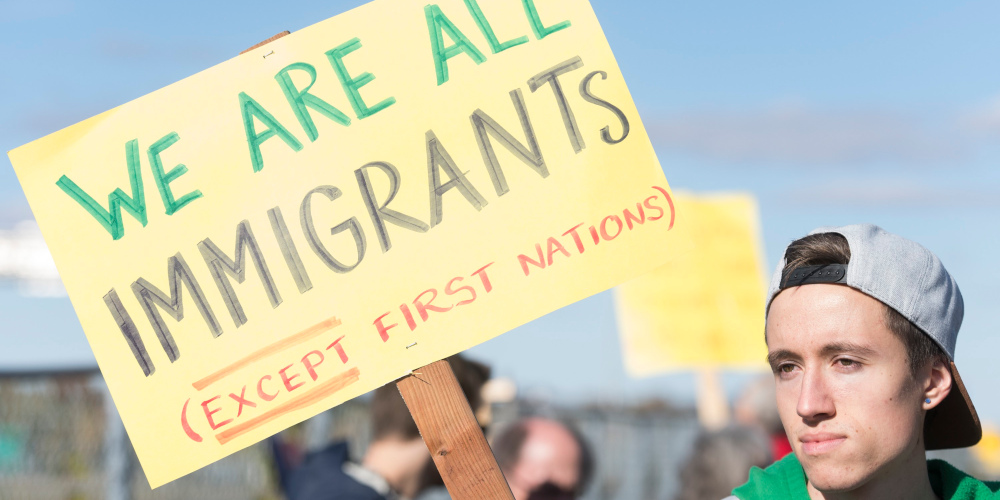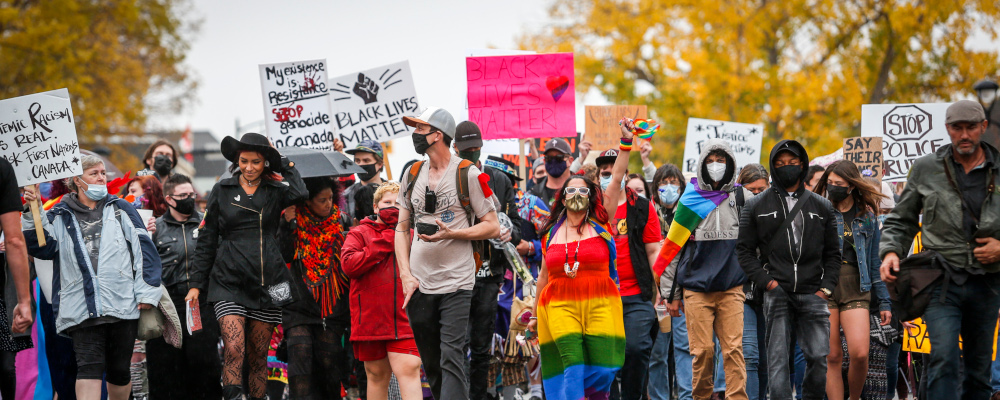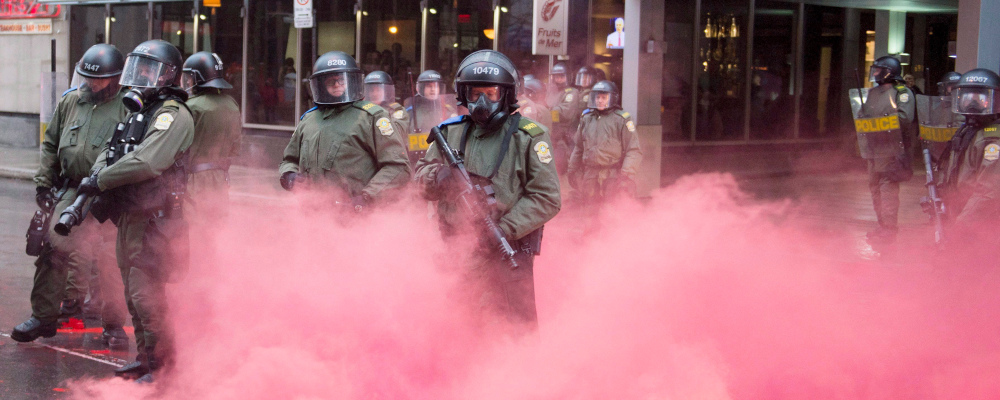Canada is currently suffering from left-liberal extremism the likes of which the world has never seen. This excess is not socialist or classically liberal, but specifically “left-liberal.” It is evident in everything from this country’s world record immigration and soaring rents to state-sanctioned racial discrimination in hiring and sentencing, to the government-led shredding of the country’s history and memory. Rowing back from this overreach will not be the work of voters in one election, but of generations of Canadians.
The task is especially difficult in Canada, because, after the 1960s, the country (outside of Quebec) transferred its soul from British loyalism to cultural left-liberalism. Its new national identity (multiculturalist, post-national, with no “core” identity) was based on a quest for moral superiority measured using a left-liberal yardstick. Canada was to be the most diverse, most equitable, most inclusive nation in world history. No rate of immigration, no degree of majority self-abasement, no level of minority sensitivity, would ever be too much.
In my new book The Third Awokening, I define woke as the making sacred of historically marginalized race, gender, and sexual identity groups. Woke cultural socialism, the idea of equal outcomes and emotional harm protection for totemic minorities, represents the ideological endpoint of these sacred values. Like economic socialism, the result of cultural socialism is immiserization and a decline in human flourishing. We must stand against this extremism in favour of moderation.

The woke sanctification of identity did not stem primarily from Marxism, which rejected identity talk as bourgeois, but from a fusion of liberal humanism with the New Left’s identitarian version of socialism. What it produced was a hybrid which is neither Marxism nor classical liberalism.
Left-liberalism is moderate on economics, favouring a mixed capitalism in which regulation and the welfare state ameliorate the excesses of the market, without strangling economic growth. Its suspicion of communist authoritarianism helped insulate it from the lure of Soviet Moscow.
On culture, however, left-liberalism has no guardrails. When it comes to group inequality and harm protection, its claims are open-ended, with institutions and the nation castigated as too male, pale, and stale. For believers, the only way forward is through an unrestricted increase in minority representation. They will not entertain the idea that the distribution of women and minorities across different occupations could reflect cultural or psychological diversity as opposed to “systemic” discrimination. This is the origin of the letters “D” and “E” in Diversity, Equity, and Inclusion (DEI). Rather than seeking to optimize equity and diversity for maximal human flourishing, these are ends in themselves that brook no limits.
Left-liberals fail to ring-fence the degree of sensitivity that majority groups are supposed to display toward minority groups. Their emphasis on inclusivity through speech suppression rounds out the “I” in DEI. From racial sensitivity training (starting in the 1970s) to the “inclusive” avoidance of words like “Latino” or “mother” that offend and create a so-called hostile environment that silences subaltern groups, majorities are expected to police their speech.
While this is reasonable when it’s meant to mock someone’s heritage, left-liberals swiftly overstep when they muzzle free expression around policy issues like immigration, crime, and education —or writing novels about groups other than one’s own. They become delusional when they silence uncomfortable truths such as the fact that, to date, documentary and forensic evidence contradict the claim that 215 children from a residential school in Kamloops were buried in a “mass grave.” In Canada, this misinformation produced a government—and media—approved moral panic which led to some 70 anti-Christian arson attacks on churches.
We need to understand progressive extremism as the end product of left-liberal logic. Woke is not a deviation from a virtuous left-liberal order, but a continuation and acceleration of it; a feature and not a bug. It represents the apotheosis of a left-liberal fusion that is more than a century old and has dominated Western high culture for over 60 years.
The first recognizably modern cultural left-liberalism was the Liberal Progressive movement which began in the first decade of the 20th century in the United States. Its spirit soon became infused with the ecumenical movement represented by the newly liberalized Protestantism of the Federal Council of Churches (FCC), beginning a few years later. Both championed liberal immigration and defended an early version of multiculturalism, opposing the “100 percent” Americanization of newcomers propounded at the time. This marked a notable change from the ecumenical movement’s pre-1905 Social Gospel Progressivism, based on temperance, anti-Catholicism, and immigration restriction.
Liberal Progressives did many good things. They defended European immigrants from Anglo-Protestant stereotypes and prejudice. But they felt no need to acknowledge the value of the Anglo heritage, perhaps because it was so dominant, they thought this superfluous. When WASP bohemian modernists like Randolph Bourne came along in 1916 and denounced their own group as boring, repressed, and uncreative compared to the exciting immigrant cultures of Europe, no left-liberals spoke up against this sweeping and reductive ethnic stereotyping.
What was established was an anti-majoritarian template that has shaped intellectual life down to the present. For instance, ethnically British left-liberal political philosophers such as Amy Gutmann or Canada’s Charles Taylor routinely derided their heritage as boring or sterile compared to the far more interesting immigrant groups. WASPy places such as pre-1970s Toronto were dismissed in similar terms as culturally repressed and uninteresting.

From the late 1960s, this was overlaid with a moralizing narrative casting white majorities as oppressive and immoral. Susan Sontag, wrote in the anti-communist left-wing magazine Partisan Review in 1966, attacking the “white race” as the “cancer of human history.” This genre of anti-whiteness built on an earlier anti-WASP tradition reaching back to Bourne, and has recently been exemplified by New York Times writers such as Nikole Hannah Jones (“the white race is the biggest murderer, rapist, pillager, and thief of the modern world”) or Sara Jeong (“Oh man it’s kind of sick how much joy I get out of being cruel to old white men.”)
Out of all this emerged left-liberalism’s “majority bad, minorities good” moral reflex. Anyone who exemplifies this attitude receives plaudits while those who question it risk being denounced as racist, sexist, or transphobic. The result is a ratcheting left-liberalism that has grown extreme enough to converge with the post-Marxism radicalism of critical race and gender theory. Given this, how can we be surprised when outrage entrepreneurs adopt a totalizing framework that paints comparatively “white” Jewish Israelis as evil and relatively “racialized” Palestinians as innocents?
The way back from left-liberalism is difficult because it is now the dominant ideology in our elite institutions. To oppose DEI is to criticize the deceptive woke slogan “be kind.” Many well-meaning liberals view this as tantamount to rejecting pets and apple pie: morally reprehensible and incomprehensible. The problem, of course, is that showing “kindness” towards certain groups (transwomen, Indigenous Peoples) entails showing unkindness towards those who are accused of harming them (gender-critical women, white people). The moral complexity of the world has been collapsed into a simplistic black-and-white binary.
Rather than determining rights on the basis of intersectional oppression points, a society that is truly good should be one that treats everyone equally, making only as much effort to pursue equality and sensitivity as is optimal to advance human flourishing. Our fetishization of what Jonathan Haidt terms the equality and care/harm moral foundations is leading to unequal group treatment and declining expressive freedom, social cohesion, and trust, culminating in an assault on our truth-based scientific and legal order.
While the common sense of the majority of Canadians opposes left-liberal extremism by a two-to-one margin, there are—in contrast to the United States and Europe—few elite checks on runaway humanitarian-egalitarian radicalism in our culture.
Canada has staked all its chips on the left-liberal square. The pathologies of this belief system are increasingly manifest, but it is far from certain that the country can change course.
Recommended for You

The Week in Polling: Young British Columbians want to escape their costly province, Trudeau’s successor, mandatory national service in the U.K., and the Edmonton Oilers

The Weekly Wrap: Poilievre proves he’s no empty populist with capital gains pushback

Brad Bradford: One year ago I ran to be Toronto’s mayor. The city is truly ‘paying’ for the leader it chose

David Polansky: Note to the EU—the Right winning elections isn’t a threat to democracy. It is democracy in action









